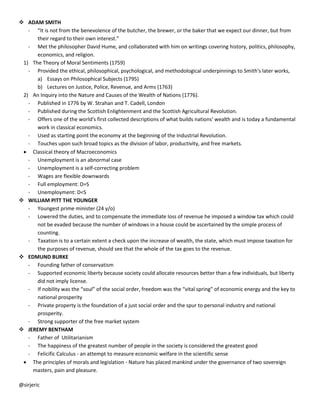1) Adam Smith was a key figure of the Scottish Enlightenment who is best known for his 1776 work The Wealth of Nations, which is considered a foundation of modern economics. It used the early economy of the Industrial Revolution as a starting point to discuss topics like division of labor, productivity, and free markets.
2) The document discusses many influential economic thinkers from the 18th-19th centuries like David Ricardo, John Stuart Mill, Karl Marx, and John Maynard Keynes and summarizes some of their major works and contributions to fields like macroeconomics, political economy, and theories of value and capital.
3) It also outlines economic concepts discussed by these thinkers like supply and






